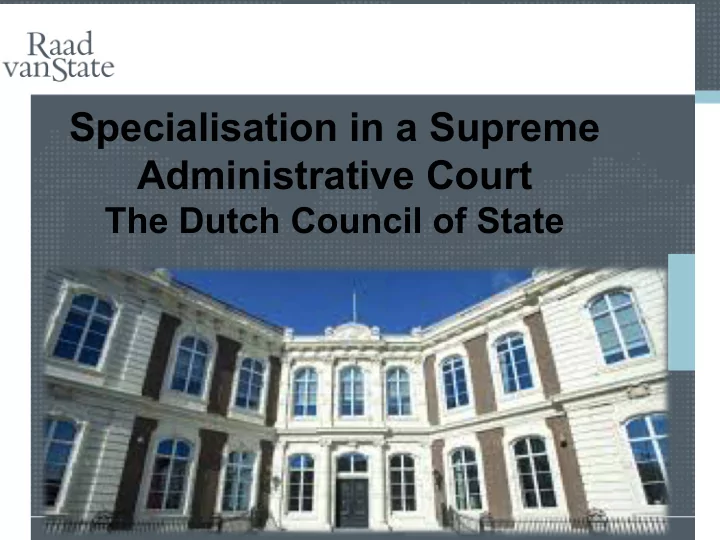

Specialisation in a Supreme Administrative Court The Dutch Council of State
Dutch Council of State • Advisary Division • Administrative Jurisdiction Division: – Three Chambers : 1. Spatial Planning Chamber 2. Immigration Chamber (regular and asylum residence permits, detention) 3. General Chamber
Environmental cases • Spatial Planning Chamber: Spatial Planning, Transport Infrastructure, Aviation, Nature Conservation . - • General Chamber (appeal): - Building, Environmental licenses for enterprises Future (2020?): Environmental Chamber
Specialisation of judges Each judge works in two chambers (50%-50%): The effect is: About half of the judges does no environmental cases; the other half does environmental cases often. Within the Spatial planning chamber: - Groups of specialist for specific cases, f.i. cases about nature conservation/ cases about windmills.
Allocation of cases to judges 1. At random within the chambers 2. For specific (environmental) cases: 2 out of 3 judges from a list of specialists - Because of the required expertise or experience or for efficiency reasons - These list are on the website of the Council of state (transparancy!).
No specialisation in environmental law at the Dutch administrative courts - System of rotation (administrative, penal and civil law) - At some courts: special chambers for certain cases (not in the field of environmental law) Reasons given: As a matter of principal: to avoid a tunnel vision Practical: the number of environmental cases at the courts are too small (to obtain and retain experience).
(Dis)advantages of specialisation For: - Specific knowledge on a technical and complex field of law can lead tot better and faster decisions Against: - Specialisation can lead to a situation where few judges determine the main lines of the case law/Risk of tunnel vision Conclusion(?): specialisation of judges in environmental law should be persued in courts where there are enough environmental cases (and judges).
How is the knowledge aquired? Training: • External (organised by the organisation/council for the judiciary) • Internal: (organised within the Council of State, mostly about new (international) case law Obtained in previous functions: • other courts • science • legal professions • public authorities
Recruitment of judges for the Council of State Depending on the needs, candidates are asked to apply with specific knowledge in the field of environmental law or other fields of law.
Recommend
More recommend